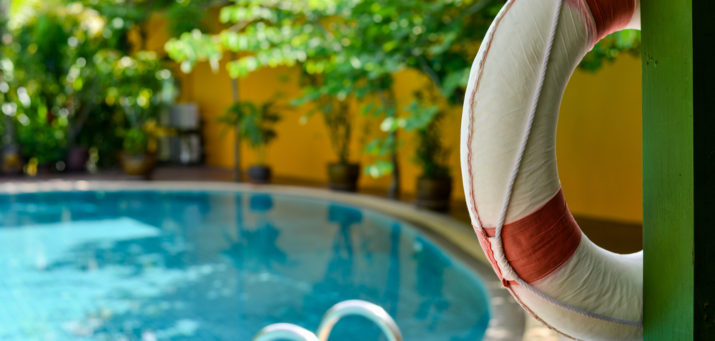Safety first! This should be the motto of every pool owner. Spending time in the pool is both fun and relaxing. It is the perfect way to enjoy being with family and friends and an excellent form of exercise. However, no form of aquatic activity is without its share of risks. By implementing proper swimming pool safety standards, you can minimize these risks and ensure that everyone stays safe around the pool and free to enjoy its many benefits. Here are our top 10 tips for pool safety.
1. Do Not Run Around the Pool
Running around the pool is a big no-no. Slipping accidents are the most common cause of pool-related injuries and can result in broken bones, head injuries, and even drowning. Always treat the swimming area as though it were slippery. Enact a strict policy of no running around the pool, and teach children to step carefully. Everyone occasionally gets carried away when having fun, especially kids, so drill in the no running rule by calling out runners every time. Consistency is key to forming good habits.
2. Supervise Children Around the Pool at All Times
Even kids who are experienced swimmers should be supervised at all times in the pool. Do not make the mistake of relying on floaties, life jackets or even other kids to protect children while in the pool. Drowning can happen in mere seconds, and the signs of drowning are not always obvious. Sadly, drownings and other pool-related accidents happen every year, even with adult supervision, but the best way to ensure kids’ safety is still to be present and vigilant every time they are around the water.
4. No Diving
The kids might not like it, but it could help avoid a serious head or neck injury. Most residential pools are not deep enough to safely allow diving, and even those six feet or deeper are not usually large enough to prevent an individual in the course of a dive from encountering the slope to shallower areas.
5. Keep a First Aid Kit on Hand
We have all heard the expression “Better safe than sorry”. Accidents happen, so be prepared by having the proper medical supplies close by and know how to use them. Responding quickly in the event of cuts, scrapes and other incidents can help prevent infections and other complications, as well as protect others from contact with biological contaminants.
6. Properly Identify the Deep End
In a residential setting, most of us don’t have depths posted around our pool. However, it is still important that swimmers know what they are getting into- literally! Acquaint visitors with the deep and shallow ends, as well as with any other information they may need to know, such as the location of steps or benches.
7. Maintain Proper Pool Chemistry
Before allowing anyone into the pool, make sure it has the proper water chemistry. Pool water can become unsafe when chlorine levels are too high or too low, or pH is imbalanced, so always be diligent to maintain the correct chemical consistency.
8. Provide Adequate Lighting
It is always a good idea to make sure your pool has adequate lighting for those evening swims. Replace weak or insufficient old pool and spa lights with clear, energy-efficient new LED lights, and make sure every area of the pool is lit. Outside of the pool, provide proper illumination in the form of porch lights, landscape lighting, etc. to ensure that steps, obstructions, and other hazards are clearly visible. Outdoor lighting can also help protect your pool area from unwanted visitors and critters!
9. Don’t Swim During Storms
Lightening and water do not mix. Clear the pool area of swimmers and seek shelter at the first sign of thunder or lightning. Be sure to wait until the storm has completely cleared before allowing further swimming.
10. Don’t Drink and Swim
Alcohol and water can be a lethal combination. Just like driving a car, swimming is an activity best avoided entirely while drinking. Those consuming alcohol are not always competent in judging how much the alcohol has affected them, and should not take part in any activities that incur risks.
There you go! Following these 9 important tips will help you prevent pool-related accidents and will keep your summer swimming enjoyable and relaxing.

